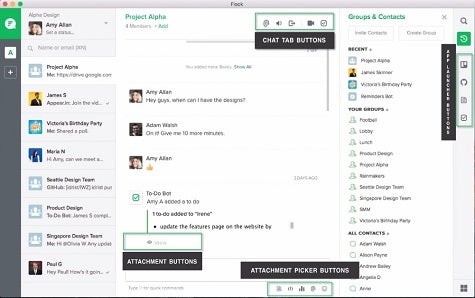How to Effectively Deliver IT Projects in the Digital Age Significant adoption of online services such as Slack coupled with rival offerings from Microsoft has shown there’s a lot of interest in alternatives to traditional email to facilitate collaboration. One of those alternatives is Flock, which today announced the availability of an application programming interface […]

How to Effectively Deliver IT Projects in the Digital Age

Significant adoption of online services such as Slack coupled with rival offerings from Microsoft has shown there’s a lot of interest in alternatives to traditional email to facilitate collaboration. One of those alternatives is Flock, which today announced the availability of an application programming interface (API) dubbed FlockOS.
Flock CEO Bhavin Turakhia says that in contrast to other APIs provided by rivals that only enable messages to be exchanged with external applications, FlockOS will enable third-party developers to build applications on top of the Flock collaboration environment that is delivered as a cloud service.
The FlockOS API empowers developers to build apps and bots using Java and node.js software development kits (SDKs). Additional SDKs for Python and Ruby are planned for the first quarter of 2017.
In general, Turakhia suggests that one of the reasons that productivity has been declining over the past decade is that vendors have been trying to layer collaboration tools on top of platforms that were designed for individual users. FlockOS, in contrast, is essentially an operating system environment on which Flock intends to create an ecosystem, says Turakhia.
At a time when email systems are being compromised by malware, more organizations will clearly be considering their collaboration options in 2017. Flock may not be as well-known as Slack. But Turakhia says a commitment to making it possible to deploy a variety of applications using FlockOS, coupled with instances of the collaboration environment that start at $3 per user per month for commercial support, will enable Flock to be competitive.

In addition, Turakhia says, FlockOS is simply flat out easier to use.
“The UI we built is much more intuitive,” says Turakhia.
It’s obviously still early days when it comes to seeing how much traction new collaboration platforms will gain. But the one thing that is becoming apparent is that large swaths of the end-user community appear to finally be ready to change the way they collaborate. The issue facing IT organizations is finding the best way to tap into that phenomenon, to increase productivity and reduce dependencies on email systems that on multiple levels are inherently flawed.
Save
MV
Michael Vizard is a seasoned IT journalist, with nearly 30 years of experience writing and editing about enterprise IT issues. He is a contributor to publications including Programmableweb, IT Business Edge, CIOinsight and UBM Tech. He formerly was editorial director for Ziff-Davis Enterprise, where he launched the company’s custom content division, and has also served as editor in chief for CRN and InfoWorld. He also has held editorial positions at PC Week, Computerworld and Digital Review.










